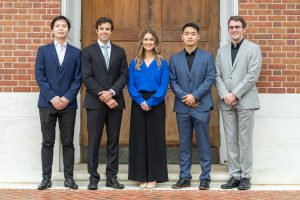
Computer science PhD students comprise two of the five Johns Hopkins students to be named 2025 Siebel Scholars, an honor that recognizes the world’s top graduate students from leading institutions of bioengineering, computer science, energy science, and business.
Since its founding in 2000, the Siebel Scholarship has been awarded to 80 Johns Hopkins graduate students. Each year, around 100 scholars are selected from leading graduate schools to join a community of nearly 2,000 researchers, scholars, and entrepreneurs. Recipients receive a $35,000 award to support their final year of study. Additionally, they are invited to attend annual conferences to discuss global issues alongside heads of state, scientists, and other experts seeking solutions to the world’s most complex and pressing problems.
The 2025 Siebel Scholars include:
Jieneng Chen
Jieneng Chen is a PhD candidate in the Department of Computer Science working with Bloomberg Distinguished Professor Alan Yuille. Chen’s research focuses on artificial intelligence, computer vision, multimodality, embodied AI, and medical AI. He has published 11 first-authored papers in top AI venues, including the Conference on Computer Vision and Pattern Recognition, the International Conference on Computer Vision, the Conference and Workshop on Neural Information Processing Systems, the International Conference on Machine Learning, the International Conference on Medical Image Computing and Computer Assisted Intervention, and MedIA. Chen’s groundbreaking work, TransUNet, initiated a new era for transformers in biomedical image analysis in 2021, garnering 4,200 citations in three years. Chen’s dedication to using AI to tackle health inequities is evident in his role as a core member of the Johns Hopkins-Lustgarten Foundation FELIX pancreatic cancer detection project and his development of the first AI model capable of diagnosing eight common cancers. He is currently developing world models of the physical world with human-level intelligence. Chen has published over 30 peer-reviewed articles and leading conference papers, with a total of 10,000 citations and an h-index of 21 as of October 2024.
Benjamin Killeen
Benjamin Killeen, a fifth-year PhD student at the Johns Hopkins University, is passionate about the future of AI- and robot-assisted interventional health care. His recent work focuses on advancing physics- and learning-based simulations—ranging from single image formation to room-scale environments—to support intelligent assistance systems and immersive educational experiences. A member of the Advanced Robotics and Computationally AugmenteD Environments (ARCADE) Lab led by John C. Malone Associate Professor Mathias Unberath, Killeen received the Link Foundation Fellowship in Modeling, Simulation, and Training in 2023. He has also served as the president of the Laboratory for Computational Sensing and Robotics Graduate Student Association and has held various roles on the Medical Image Computing and Computer Assisted Intervention Society Student Board. Killeen’s professional experience includes internships with IBM Research – Almaden, Epic Systems, and Intuitive Surgical. In 2019, he graduated with honors from the University of Chicago with a BA in computer science and a minor in physics. In his free time, Killeen enjoys running, bouldering, and creative writing.